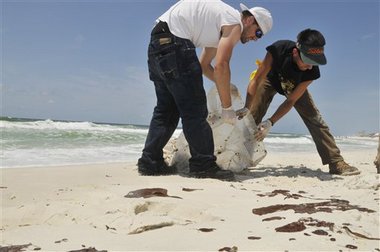BP could reap billions of dollars in tax credits from oil spill settlement
(AP Photo/Michael Spooneybarger)A crew picks up oil that washed up along Pensacola Beach, Fla., Friday, June 4, 2010. BP,
which caused the biggest environmental catastrophe ever seen on U.S.
shores, may be poised to receive the biggest tax break in American
history as a result of it.
The British oil company already has
claimed $10 billion in tax credits from the 2010 disaster, caused when
its Deepwater Horizon drilling rig exploded and spewed millions of
gallons of oil into the Gulf of Mexico.
Taxpayers could be asked
to shoulder billions of dollars more under terms of a settlement
currently being negotiated between BP and the federal government. Both
sides have incentive to make a deal: The Department of Justice wants to
avoid a lengthy court trial, and BP wants to get on with its life.
The
total fine paid by BP could reach $21 billion or more – generating a
nice headline for the Obama administration. But check the fine print.
The settlement could include hidden subsidies that make the true amount
substantially less.
Specifically, the agreement may shift more of
the penalties into Natural Resource Damages assessments – which are tax
deductible – and away from the Clean Water Act, which carries a tax rate
of up to 35 percent.
The deal appeared to be on a fast track until
an Oct. 1 report by the Press-Register that revealed its potential to shortchange victims of the spill. The
agreement stalled after Gulf Coast political leaders expressed outrage
over the report, but officials familiar with the negotiations say that
talks are ongoing.
Both the Justice Department and BP declined to comment on any potential settlement.
The
stakes are high for the Obama administration. A deal ahead of the Nov. 6
election could be a political windfall for the president, particularly
in the battleground state of Florida. But the consequences of giving BP a
massive tax break could also be severe.
“This should give
President Obama pause,” said U.S. Sen. Richard Shelby, R-Tuscaloosa. “In
light of the fact that he has bashed tax breaks for Big Oil on the
campaign trail, he would have a lot of explaining to do if Big Oil got a
huge tax break because his administration siphoned money from oil spill
victims.”
Shelby and others said weighting the fines toward NRDA
would give the federal government more control over how the money gets
spent, since NRDA fines are routed to the U.S. Treasury. Clean Water
fines, by contrast, would be routed to the Gulf states under Restore Act
legislation signed by Obama in July.
That equals a win for the
government and a win for BP. Financial experts said the deduction could
be worth billions of dollars to the company.
“It’s hugely
significant to BP to structure the settlement this way,” said Thomas
Claps, a former trial attorney and legal analyst for New York-based
Susquehanna Financial Group who has been closely following the BP
negotiations.
The big loser? That would be the taxpayers along the Gulf Coast – the real victims of the catastrophe.
Alabama
and Mississippi would get an extra kick in the pants. A settlement
weighted toward NRDA would take hundreds of millions of dollars away
from the two states and award it to Louisiana, which suffered the brunt
of environmental damage from the spill.
Florida could also reap
additional funds – but with a twist. A NRDA settlement could steer money
away from the Panhandle, which suffered lost tourism business, and
toward south Florida, where it could be used for restoration of the
Everglades.
Alabama political leaders have vowed to fight any deal
that would circumvent the Restore Act, which received rare bipartisan
support in Congress.
“Obviously BP prefers to pay it under the
fund that is tax deductible, and their lawyers are working to accomplish
that,” said U.S. Sen. Jeff Sessions, R-Mobile. “We believe Congress
dealt with how the money should go, and that is through the Restore
Act.”
A leading government watchdog group said the Justice
Department routinely gives corporations a free pass by allowing them to
write off fines as a business expense. But that practice actually
rewards bad behavior, according to the U.S. Public Interest Research
Group.
“When businesses are allowed to shirk financial
responsibility for their own wrongdoing, it weakens deterrence to bad
behavior in the future,” said Ryan Pierannunzi, spokesman for the
Washington, D.C.-based consumer advocacy group. “If BP takes the costs
as a tax deduction, taxpayers end up making up for the lost revenue by
paying more in taxes or seeing public services cut.”
Gulf Coast
citizens, he said, lose twice because they suffered the consequences of
BP’s wrongdoing and then have to pick up the tax tab.
U.S. Rep. Jo Bonner, R-Mobile, said the solution is simple: Don’t cave in to BP.
“All (Attorney General) Eric Holder has to do is take that option off the table,” Bonner said.
How
a deal that bad ever got on the table is a question that should
resonate on the Gulf Coast. It’s the equivalent of allowing bank robbers
to deduct the cost of their getaway cars or counterfeiters to write off
the cost of their ink.
Worse, it’s a slap in the face to the victims of BP's criminal negligence.
“How
can BP characterize the suffering of my brother’s family as a business
expense — one that is entitled to millions of dollars in tax credits?”
said Chris Jones, whose brother, Gordon Jones, was one of the 11 men
killed on the Deepwater Horizon rig. “We shouldn't pay for BP's
mistakes.”
Source:-
http://blog.al.com/live/2012/10/bp_could_reap_billions_of_doll.html 